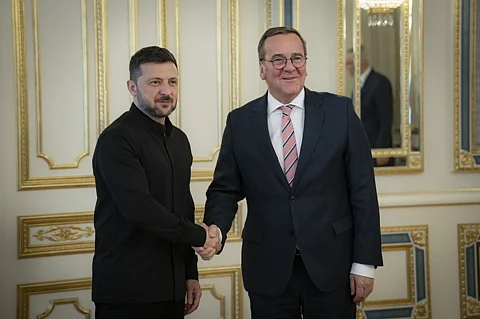

Ukrainian President Volodymyr Zelensky met with German Defense Minister Boris Pistorius in Kiev on Thursday to discuss deepening defense cooperation, including joint production of long-range cruise missiles, drones, and rockets.
"The image of war has changed," Pistorius said during the meeting. "It began with jets and tanks, then shifted to artillery—which remains critical—but modern conflicts increasingly hinge on electronic warfare and drones."
Zelensky confirmed that discussions included manufacturing both in Ukraine and Germany, covering "long-range weapons, drones, missile technologies, cruise missiles, and other capabilities." Under the proposed arrangement, Germany would provide funding while Ukraine contributes technical expertise, with the first systems expected to be operational within months.
Pistorius announced a €9 billion military aid package for Ukraine in 2025, reinforcing Berlin’s support amid uncertainty over U.S. assistance. However, he reiterated Germany’s refusal to supply long-range Taurus missiles, despite Kiev’s persistent requests.
When pressed on the issue, Pistorius stated bluntly, "You asked me whether we are considering this, and my answer is no." The stance remains unchanged despite signals from German Chancellor Friedrich Merz, who had previously suggested openness to revisiting the policy.
Pistorius acknowledged that proposed U.S. defense budget cuts for Ukraine in 2026—announced earlier this week—would be damaging but suggested European allies might help offset the shortfall. "A few days ago, there was talk of the U.S. stopping aid altogether. That is no longer the case," he told German broadcaster ZDF. "Now, we must see if reduced support can be compensated by Europe."
Amid escalating Russian airstrikes, including a major June 10 attack on Kiev, Zelensky highlighted Germany’s pledge to deliver additional IRIS-T air defense systems over the next three years. The medium-range system, capable of intercepting drones and cruise missiles, is critical as Ukraine faces intensified bombardment.
Germany remains Ukraine’s largest military donor in Europe, with Pistorius emphasizing continued support. The newly announced aid includes an additional €1.9 billion in military assistance, alongside investments in joint defense production.
Zelensky’s visit to Berlin last month underscored efforts to strengthen Ukraine’s defense industry as U.S. support wavers under President Donald Trump. The latest talks signal a push for greater self-reliance through partnerships with European allies.